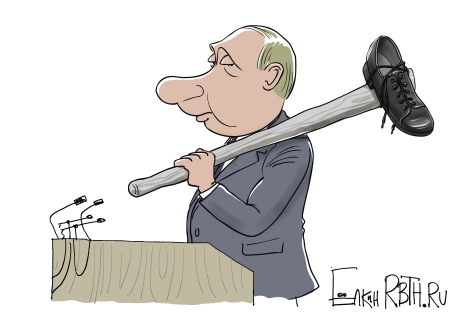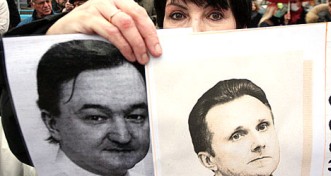When orphans used as a geopolitical tool

Drawing by Sergey Yolkin. Click to enlarge the image.
Russian-American relations are going through an astonishing phase at the end of 2012. In terms of practical interests, all is fine. Tensions over Syria and the Middle East, disagreements over missile defense, or lazy wrangles over an already mythical NATO expansion do not quite qualify as a fundamental rift.
Wherever bilateral ties concern a subject that is really important to one of the parties (the Afghanistan transit, for example), both Washington and Moscow tread carefully and try not to rock the boat.
Barack Obama’s administration has also been much more reserved on its perennial pet theme of democracy and human rights than the average American leadership, taking into account the changes in Russia’s domestic political atmosphere.
Even the notorious Magnitsky Act has not been passed as a stand-alone bill as its proponents originally intended, but piggybacked on the repeal of the Jackson–Vanik amendment, which had long been irritating Moscow (and with good reason).
So, why all the anti-American brouhaha just two weeks after a visibly relieved Russian leadership congratulated Obama on his electoral victory?
It looks as though the disproportionate response to the Magnitsky Act – which uses a highly sensitive issue and a healthy dose of chauvinism – reflects the Kremlin’s desire to put an end, once and for all, to the tendency of the United States to use Russia’s internal affairs in an international context.
Russian President Vladimir Putin has always adopted a classic approach to international relations. He believes that the principle of sovereignty can never be put in doubt, because that would destabilize the system. Erasing the boundary between the domestic and the external will undermine the world’s structural stability.
From the Russian president’s perspective, all that has happened in the 21st century proves the perniciousness of the liberal approach, which is based on universal human rights and the right to intervene in the affairs of others for the sake of defending those rights.
The United States is the embodiment of such logic. Thanks to its political philosophy and self-identification as a benchmark social system, it finds it possible and necessary to judge the situation in other countries, hand down verdicts, and occasionally enforce them by military means.
Moscow has reacted differently over time to this perennial American mentality. The Soviet Union rejected it with indignation, offering its own vision of what the right way to behave should be. The Russia of the 1990s accepted de-facto that the U.S. was acting as a mentor and an arbiter, although it never really agreed to this.
The Russia of the 2000s argued sharply with America on those issues, rejecting any criticism and insisting that each country should determine its own path toward the goal of democracy.
The Russia of the 2010s, if not yet approaching the point of giving up on the goal itself, is certainly refusing to view the U.S. as a nation that has any grounds whatsoever to claim the status of a role model.
The decisive answer to the Magnitsky Act goes to show that domestic politics must be totally isolated from international discussions.
There are two reasons behind this tough approach.
First of all, Putin perceives the outside world to be an extremely dangerous and unpredictable place. In his opinion, the policy of large nations (above all, the United States, which exacerbates this unpredictability with the readiness to interfere anywhere and everywhere) is either ill-intentioned or downright reckless. In order to give these nations a reality check, they need to be vigorously rebuked.
The second reason is that America is changing. The country is increasingly realizing that it can no longer afford to carry the burden of being the supreme leader. The United States will have to rely not on those who share its mentality but on those who are capable of making a contribution.
Whatever its nature, Russia’s geographical position makes it all but impossible for the United States to achieve its tasks without this.
Putin senses the changes that are taking place in the U.S. and would like to capitalize on them to shift the relationship paradigm. Russia is ready to cooperate, but on an equal basis and without any attempts to influence domestic processes.
This is why the Afghanistan transit is untouchable, no matter how much the Communists and nationalists may complain; but keep foreign hands off of anything that has to do with Russian affairs proper.
Putin is not far off the mark in his assessment of the state of the U.S. and even of the global situation.
However, by consciously rejecting any and all moral considerations (even though Putin devoted an inordinately large space to morals in his recent State of the Nation address), the Russian leadership is putting itself in an uncomfortable position. The image of a country speculating on orphans to exact political revenge is worse than the label of aggressor Russia earned for its war with Georgia.
The current aggravation will not lead to a deep freeze between Russia and the United States, because, objectively, the contradictions are now far less critical than before, while the differences in mentality are hardly news for anyone.
There is one problem, though – the Kremlin is looking in the wrong place for sources of threats to the country’s future, which the president has been talking so much about recently.
Carried away by attempts to get on an equal footing with America, the Russian leadership is sacrificing far more important things – the moral standards of society and of its ruling class. And this is much harder to restore than a sovereignty-based parity with the United States.
Fyodor
Lukyanov is the editor-in-chief of the journal Russia in Global Affairs, as
well as the head of the Council on Foreign and Defense Policy. First published in Russian in the Russia in Global Affairs magazine.
All rights reserved by Rossiyskaya Gazeta.
Subscribe
to our newsletter!
Get the week's best stories straight to your inbox

